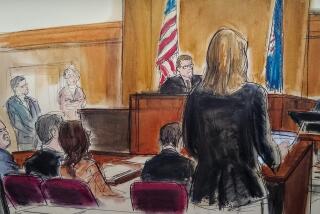SOCIETY : London Student’s Date Rape Trial Stirs Wider Debate
- Share via
LONDON — For the past week, college students, university administrators, social commentators, feminists and newspaper readers have watched a troubling drama unfold here concerning date rape.
Austen Donnellan, a 21-year-old student, was acquitted by a criminal court jury--which included nine women--of raping a female student, also 21.
But the testimony before the court in the case has stirred a wider debate on the nature of rape, modern college life in London and the role of university authorities in disciplining sexual misconduct.
The story began at a holiday party last December when Donnellan and the unidentified woman, both at King’s College of the University of London, were out on the town. Donnellan, according to trial accounts, had fallen for the woman and had courted her. He had sent her Valentine’s Day flowers and other gifts. She had indulged in regular kissing sessions with him.
But she said she found him sexually repulsive, and the relationship went no further. In a phrase that became a tabloid newspaper headline, she declared: “A kiss is just a kiss. Ask any student. To me, the kisses meant nothing.”
On that December evening, the woman went with Donnellan to a London pub and ended up at a party at her college residence hall. She reportedly had consumed a large amount of alcohol. At the party, she “necked” with at least three men, including Donnellan.
He testified that he escorted the woman back to her room around midnight. He insisted that he would never take advantage of a drunken companion and that she had willingly engaged in sex. They then went to sleep; four hours later, he recommenced. But she angrily demurred.
The woman went, not to the police, but to college authorities, charging Donnellan with rape. She did not want to involve the police, she said. But she insisted that Donnellan be disciplined by the college and quietly expelled--a few months before he was to graduate.
With his degree and career at stake, Donnellan, believing the college discipline board would accept the woman’s version, went to police and insisted that he be charged with the crime of rape so he could face trial in open court.
In the trial, the woman admitted she was drunk and had no recollection of events, declaring: “I did not consent because I could not. . . .
“My attitude always has been that sex is OK providing both parties agree to it,” she said. “The issue in this case is not, ‘Did I consent?’ Because I couldn’t either way. I was unconscious. I believe he raped me and should be punished.”
But Judge Geoffrey Grigson, in summing up the case, observed: “A person who is drunk, and because she is drunk consents to an act, which she would not when sober, still consents. . . . If she can’t be sure she didn’t consent, how can the jury?”
In the verdict’s aftermath, dozens of esteemed commentators here have weighed in on the case.
Simon Rix, president of the 70,000-member London University Students’ Union, has called for the complaints procedure to be reviewed, adding: “Date rape does exist, but it is not for college authorities to have disciplinary procedures that have low standards of justice.”
Kinder critics said the college was not solely concerned with protecting its reputation but was hamstrung by the woman’s stance: She wanted Donnellan punished without police involvement; they wanted to protect her confidentiality.
Isabel Hilton, a journalist and feminist, declared that getting drunk and “accusing your partner of rape has nothing to do with women’s rights: It is an abuse of the power that many generations of feminists fought for--the power to make their word count and to be taken seriously.”
In a breezier summation, columnist Nigella Lawson, daughter of the former chancellor of the Exchequer, Lord Lawson, dryly observed: “Rape is a terrible thing. That is beyond debate. But to wake up and find yourself in bed with someone, when sober you wouldn’t touch with a barge pole, is not such a big deal. We’ve all been there, honey. It’s called student life.”
More to Read
Sign up for Essential California
The most important California stories and recommendations in your inbox every morning.
You may occasionally receive promotional content from the Los Angeles Times.








